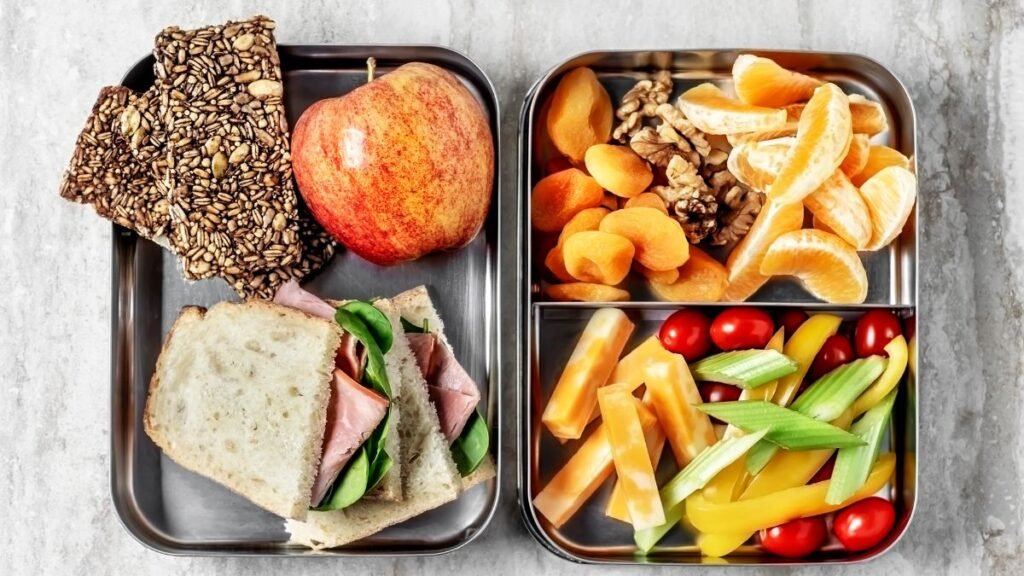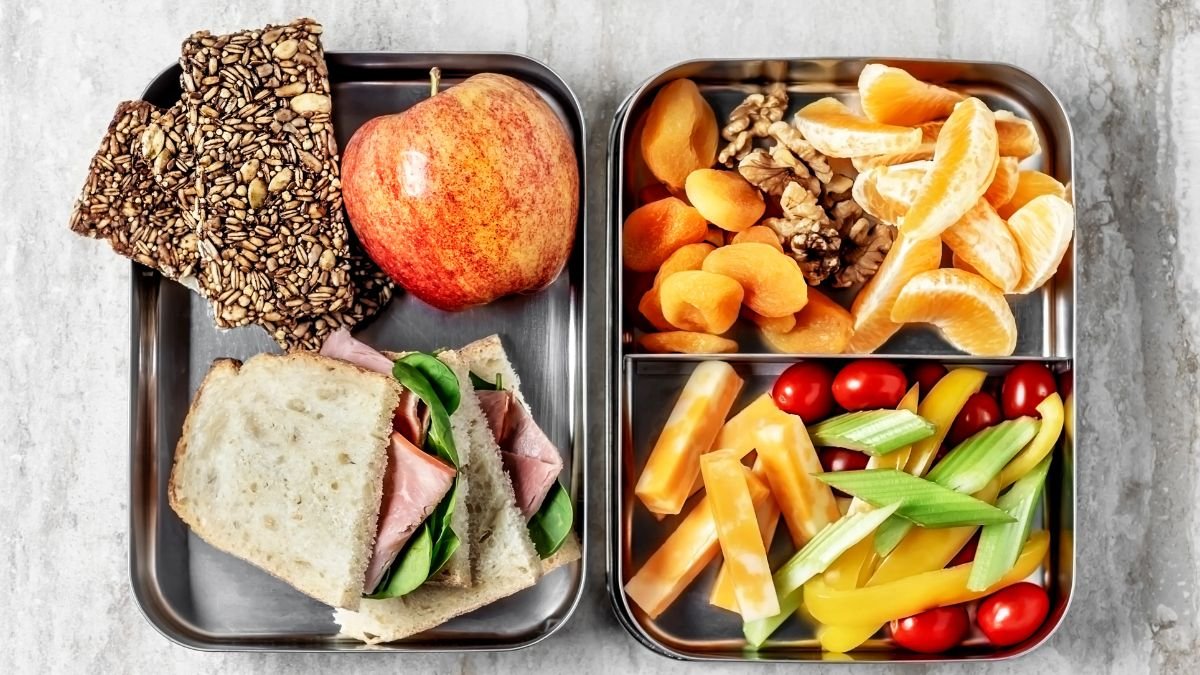Eating Healthy | 30 Amazing Tips for Eating Healthily on the Go
Eating healthy is a lifestyle choice that emphasizes consuming nutrient-dense foods that promote good health and well-being. It involves selecting foods that are minimally processed and contain a variety of vitamins, minerals, and other important nutrients.
Eating healthy also emphasizes mindful eating practices, such as limiting portion sizes and avoiding overeating. Eating healthy diet helps maintain a healthy weight, reduce the risk of chronic illnesses, and improve overall health.

30 Tips for Eating Healthily on the Go
- Pack your own meals and snacks: Packing your own meals and snacks ensures you have healthy and nutritious options available when you’re on the go. Prepare meals and snacks the night before or in the morning before heading out for the day.
- Choose nutrient-dense foods: When selecting meals and snacks on the go, choose foods that are nutrient-dense and contain plenty of vitamins and minerals. Examples of nutrient-dense foods include fruits, vegetables, lean proteins, whole grains, legumes, nuts, and seeds.
- Eat breakfast: Eating breakfast is an important part of beginning the day right. If you’re short on time, choose portable breakfast options such as oatmeal, a smoothie, or a breakfast burrito.
- Choose whole fruits and vegetables instead of juice: Whole fruits and vegetables provide more vitamins, minerals, and fiber than juice. If you’re in a hurry, pack a piece of fresh fruit or a handful of pre-cut vegetables for a nutritious snack.
- Choose healthy snacks: When snacking on the go, choose healthy options such as yogurt, hummus and cut vegetables, or a piece of fruit. Avoid processed and sugary snacks, as they are often high in calories and low in nutrition.
- Choose lean proteins: When selecting protein-rich foods on the go, choose lean proteins such as chicken, turkey, fish, and tofu. Avoid processed and fried proteins like bacon, sausage, and processed deli meats, as these are often high in sodium and unhealthy fats.
- Choose healthy fats: Healthy fats such as olive and avocado oil, nuts, and seeds are important for maintaining a healthy diet. Add a few nuts or seeds to your salads and meals for an extra boost of healthy fats.
- Choose whole grains: Whole grains are an important part of a healthy diet. Choose whole grain breads, pastas, and other grain-based foods for a more nutritious option.
- Avoid added sugars: Added sugars are often added to processed and packaged foods to enhance flavor. Eating too much added sugar can lead to weight gain and other health issues. Avoid added sugars by reading labels carefully and choosing minimally processed foods.
- Limit processed and packaged foods: Processed and packaged foods are often high in sodium, unhealthy fats, and added sugars. Choose fresh, whole foods as much as possible to get the most nutrition.
- Avoid fast food: Fast food is often high in calories and unhealthy fats and low in nutrition. If you’re in a hurry, there are healthier fast-food options available such as salads, grilled chicken, and veggie burgers.
- Plan ahead: Planning ahead and having meals and snacks readily available can help you stay on track with healthy eating.
- Drink plenty of water: Staying hydrated is important for maintaining good health. Carry a refillable water bottle with you throughout the day and drink regularly.
- Make healthy choices at restaurants: When dining out, choose healthier options such as grilled proteins, salads, and vegetables. Avoid dishes that are fried, covered in sauce, or loaded with cheese.
- Choose healthier sides: When ordering meals, choose healthier sides such as a salad or steamed vegetables instead of french fries or other high-calorie options.
- Watch your portion sizes: Eating large portions can lead to weight gain and other health issues. Choose smaller portions when eating out or divide larger portions into two meals.
- Eat slowly: Eating quickly can lead to overeating and poor digestion. Take your time when eating and savor the flavor of your food.
- Eat mindfully: Mindful eating involves paying attention to hunger cues, savoring your food, and eating without distractions. Eating mindfully can help you become more aware of your eating habits and can help you make healthier choices.
- Avoid fried foods: Fried foods are often high in calories and unhealthy fats. Choose grilled, steamed, or baked foods instead.
- Choose low-sodium options: Eating too much sodium can lead to high blood pressure and other health issues. When selecting meals or snacks, look for items with lower sodium content.
- Choose healthy condiments: Choose healthy condiments such as mustard, salsa, and low-fat dressings. Avoid high-calorie condiments such as mayonnaise and cheese.
- Avoid sugary drinks: Sugary drinks such as soda and sweetened coffee drinks are often high in calories and low in nutrition. Choose water, unsweetened tea, or low-fat milk instead.
- Limit alcohol: Alcohol is high in calories and can lead to poor decisions when it comes to eating. Choose lower-calorie alcoholic beverages such as wine or light beer, and limit your intake.
- Choose grilled sandwiches: Sandwiches are a convenient and portable meal option. Choose a grilled sandwich instead of a fried or processed sandwich for a healthier option.
- Avoid processed meats: Processed meats such as bacon, sausage, and deli meats are often high in sodium and unhealthy fats. Choose lean proteins such as chicken and fish instead.
- Choose salads with caution: Salads can be a healthy option, but they can also be high in calories if they are topped with high-calorie dressings, fried proteins, and cheese. Choose salads with lean proteins, vegetables, and a light dressing.
- Make healthy substitutions: When eating out, choose healthy substitutions such as a side salad in place of french fries, or grilled proteins in place of fried proteins.
- Bring healthy snacks: If you’re going to be out for a few hours, bring healthy snacks with you to avoid getting too hungry and making poor food choices.
- Plan for treats: Eating healthy doesn’t mean you can’t enjoy a treat every now and then. Plan for occasional treats, such as a piece of cake or a scoop of ice cream, so you don’t feel deprived.
- Get creative: Eating healthily on the go doesn’t have to be boring. Get creative and try new foods, recipes, and meal combinations to keep your meals interesting and tasty.
Eating healthily on the go is possible with a little planning and preparation. By following the tips listed above, you can ensure you have healthy and nutritious meals and snacks available when you’re on the go. Eating healthy is an important part of maintaining a healthy lifestyle and promoting good health and well-being.

